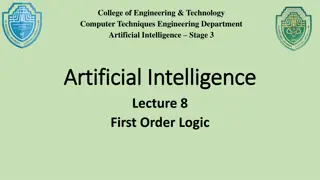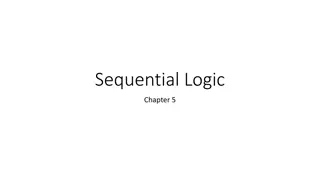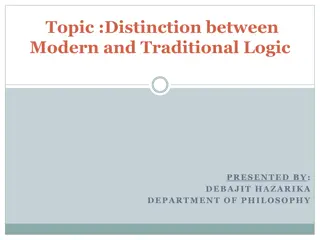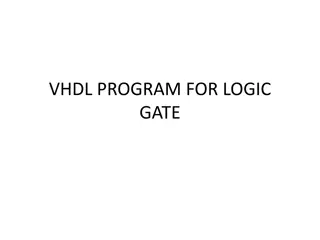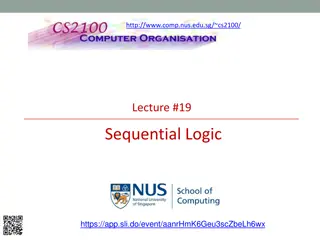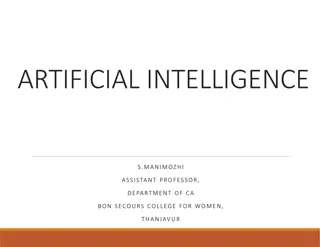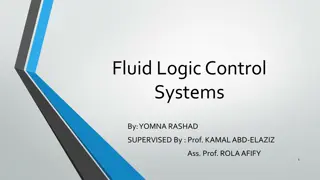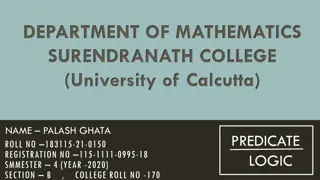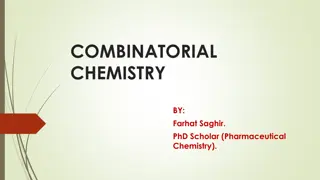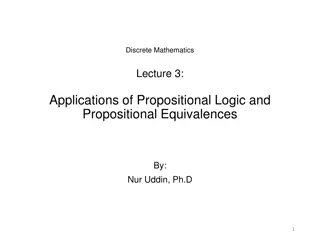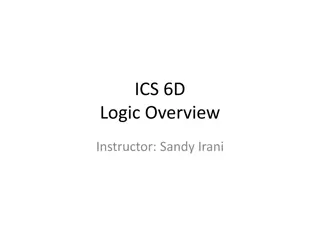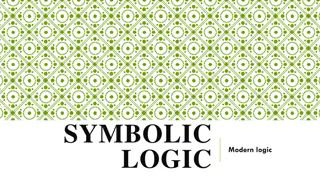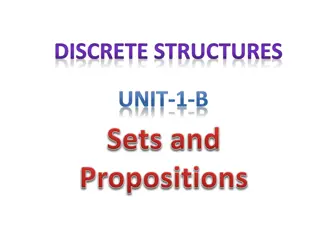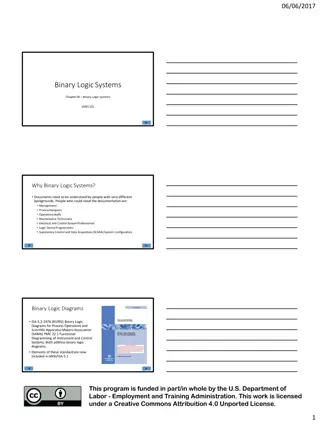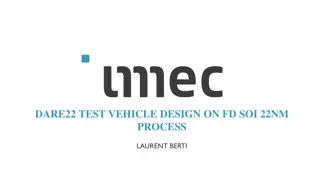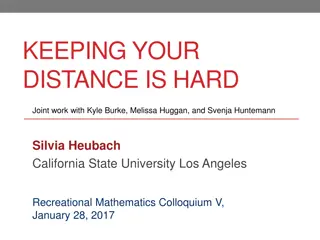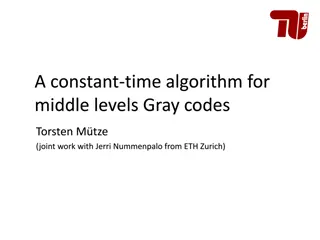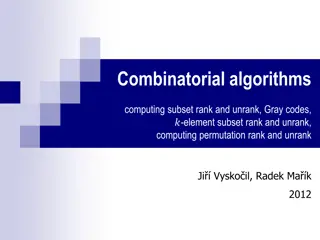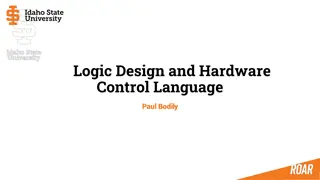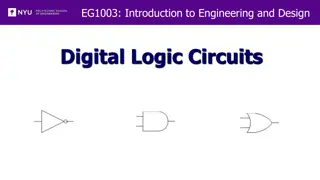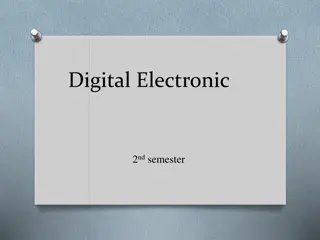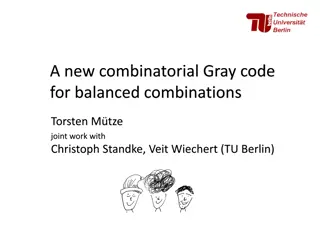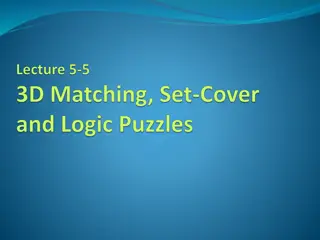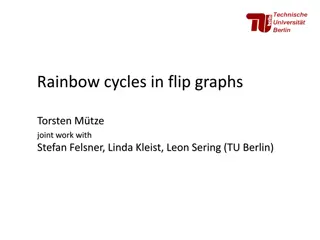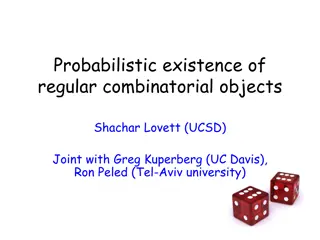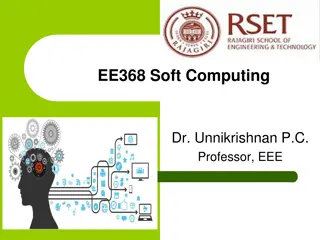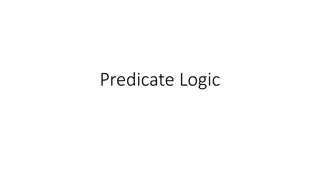Understanding First-Order Logic in Artificial Intelligence
Delve into the realm of first-order logic in artificial intelligence as a knowledge-based agent represents and deduces actions in its operating world. Explore the limitations of propositional logic and the expressive power of first-order logic, along with syntax, semantics, and models in logical lan
3 views • 27 slides
Understanding Sequential Logic Circuits in Digital Systems
Logic circuits in digital systems can be either combinational or sequential. Sequential circuits utilize storage elements along with logic gates, where outputs depend not only on present inputs but also on past inputs and internal states. They are essential building blocks, with storage registers pl
5 views • 20 slides
Topic : Distinction between Modern and Traditional Logic.
Logic, as a normative study, focuses on distinguishing correct reasoning from incorrect. Traditional logic, based on Aristotle's work, emphasized syllogistic reasoning, while modern logic, pioneered by figures like Leibnitz and Russell, employs mathematical methods and symbolic logic for a more adva
2 views • 10 slides
Logic Families
Logic families such as Diode Logic (DL), Resistor-Transistor Logic (RTL), and Diode-Transistor Logic (DTL) each have distinct capabilities and limitations when it comes to performing logic functions. While DL gates are simple and inexpensive but limited in functionality, RTL gates offer both normal
1 views • 22 slides
VHDL Logic Gate Programming Examples
This content provides VHDL code examples for various logic gates including AND, OR, NOT, XOR, and X-NOR gates along with their corresponding circuit diagrams. Each code snippet is accompanied by a brief explanation and a visual representation of the logic operation. The provided VHDL code can be uti
0 views • 7 slides
Understanding Sequential Logic in NUS CS2100 Lecture #19
Explore the concepts of sequential logic in Lecture #19 by Aaron Tan at NUS, covering memory elements, latches, flip-flops, asynchronous inputs, synchronous sequential circuits, and different types of sequential circuits. Delve into the distinction between combinatorial and sequential circuits, memo
3 views • 26 slides
Understanding Predicate Logic in Artificial Intelligence
In the world of artificial intelligence, predicate logic plays a crucial role in representing simple facts. It involves syntax, semantics, and inference procedures to determine the truth value of statements. Real-world facts are represented using propositions in logic, allowing for structured knowle
1 views • 19 slides
Introduction to Fluid Logic Control Systems
Fluid logic control systems utilize devices that switch fluid, like air, between outlets, providing ON/OFF outputs swiftly based on control signals. This article explores moving-part logic devices, control functions, Boolean algebra applications in control technology, and advantages of fluid logic s
1 views • 22 slides
Understanding Logic Circuits in Aircraft Systems
Aircraft logic systems follow MIL/ANSI standard logic symbols and conventions used in electronic applications. Inverters, buffers, AND gates, OR gates, NAND gates, NOR gates, Exclusive-OR gates, and Exclusive-NOR gates are commonly used in aircraft logic circuits. These gates have specific behaviors
0 views • 52 slides
Introduction to Predicate Logic in Mathematics
Predicate logic is a powerful tool used in mathematics to express complex relationships and assertions that cannot be adequately represented by propositional logic. It allows for the quantification of statements over a range of elements using predicates and quantifiers like universal and existential
1 views • 13 slides
Developing Effective Logic Models for Continuous Program Improvement
Explore the essentials of logic models and their significance in evaluating programs for continuous improvement, presented by Hawley Carlson and Alicia Blood. Learn about theory of change, logic model components, and using logic models for evaluation planning.
4 views • 12 slides
Understanding Combinatorial Chemistry in Pharmaceutical Research
Combinatorial chemistry is a powerful method in drug discovery allowing for the synthesis of a large number of compounds simultaneously. This process helps in lead identification and optimization, enabling the screening of diverse compound libraries for potential biological activity. Various design
0 views • 42 slides
Applications and Equivalences in Propositional Logic
This lecture explores applications of propositional logic, including translating sentences, system specifications, logic puzzles, and logic circuits. It also defines tautology, contradiction, and contingency as types of compound propositions, along with logical equivalences. Examples and illustratio
0 views • 16 slides
Understanding Logic in Mathematics and Computer Science
Logic is a branch of mathematics that deals with true or false values. It is essential for fields like computer science, aiding in AI, automated reasoning, and digital logic design. Propositions, logical operations like conjunction and disjunction, and the use of propositional variables are fundamen
0 views • 28 slides
Understanding Propositional Logic and Logical Operators
Learn about propositional logic, statements, logic operators, compound statements, exclusive-or, logical equivalence, and writing logical formulas for truth tables. Explore how to create compound statements for exclusive-or using different approaches and ensure logical equivalence. Enhance your know
0 views • 26 slides
Understanding Symbolic Logic: A Modern Approach
Delve into the world of symbolic logic where traditional and modern approaches differ. Learn how symbolic languages help overcome challenges with natural languages, leading to a clearer understanding of deductive reasoning through the analysis of premises, conclusions, compound statements, and logic
1 views • 32 slides
Understanding Propositional Logic and Mathematical Logic in Computer Science
Study the development of formal logic in computer science, focusing on propositional logic and mathematical logic. Learn about propositions, logical operators, and ways of combining statements to derive conclusions. Explore examples and understand how to determine the validity of arguments using log
0 views • 38 slides
Understanding Binary Logic Systems in Documentation
Binary logic systems play a crucial role in documentation for individuals with diverse backgrounds such as management, process designers, operations staff, maintenance technicians, and more. These systems, depicted in binary logic diagrams, provide a clear and concise representation for various prof
4 views • 16 slides
Overview of DARE22 Test Vehicle Design on FD SOI 22nm Process
This detailed presentation explores the test structures and components inside the TV, including combinatorial logic, sequential logic, clock gating, ring oscillators, input-output cells, analog IPs, and more. It covers various test scenarios such as irradiation testing, SET/SEU measurements, functio
1 views • 32 slides
Introduction to Symbolic Logic: Understanding Logical Inferences
Logic is the study of reasoning methods to distinguish between correct and incorrect arguments. Symbolic Logic involves representing logic symbolically for easier understanding and manipulation. Logical inferences help in making decisions based on reasoning chains. The content discusses the use of l
1 views • 28 slides
Understanding Discrepancy Minimization in Combinatorial Concepts
Explore the intriguing world of Discrepancy Minimization through concepts like walking on the edges, subsets coloring, arithmetic progressions, and more. Delve into fundamental combinatorial concepts and complexity theory to understand the significance of Discrepancy theory in various fields. Discov
0 views • 33 slides
UBU Performance Oversight Engagement Framework Overview
Providing an overview of the UBU Logic Model within the UBU Performance Oversight Engagement Framework, this session covers topics such as what a logic model is, best practice principles, getting started, components of the logic model, evidence & monitoring components, and next steps. The framework
0 views • 33 slides
Solving Combinatorial Problems: Dice Rolls, 8 Queens, and Chess Board Exploration
Implement methods for rolling dice with a specified sum, solving the 8 Queens problem, and exploring chess board configurations. Utilize different algorithms and decision-making processes to tackle these combinatorial challenges effectively.
0 views • 8 slides
Deciphering Combinatorial Games Through Mathematical Analysis
Discover the intricacies of combinatorial games by analyzing strategies for winning and understanding the dynamics of distance games on graphs. Learn about known distance games like COL, SNORT, and NODEKAYLES, and explore techniques such as strategy stealing and mirroring to determine optimal gamepl
0 views • 22 slides
Middle Levels Gray Codes: Loopless Generation Algorithms and Conjecture
Combinatorial Gray codes involve generating combinatorial objects with minimal differences between consecutive objects. The Middle Levels Conjecture focuses on cyclically generating ground set subsets with specific characteristics. This conjecture has led to significant theoretical and experimental
0 views • 15 slides
Combinatorial Algorithms for Subset and Permutation Ranking
Combinatorial algorithms play a crucial role in computing subset and permutation rankings. These algorithms involve defining ranking functions, successor functions, lexicographic ordering on subsets, and permutation representations. The functions SUBSETLEXRANK and SUBSETLEXUNRANK are used for comput
0 views • 22 slides
S32K3 Real-Time Development Training Overview
Explore the S32K3 Real-Time Development (RTD) training for Logic Control Unit (LCU) in automotive applications. Learn about LCU configuration, main API functions, example codes, Look-Up Table (LUT) setup, and tips for optimal usage. Discover how LCU interacts with combinatorial logic, latches, and a
0 views • 22 slides
Understanding Logic Design and Hardware Control Language
Exploring the fundamental concepts of logic gates, combinatorial circuits, HCL, TAPPS, multiplexors, and the differences between HCL and C language regarding Boolean expressions and circuit evaluation. Learn how HCL handles word-level signals and constructs word-level circuits.
0 views • 17 slides
Improved Truthful Mechanisms for Subadditive Combinatorial Auctions
This research paper discusses strategies to maximize welfare in combinatorial auctions. It explores mechanisms for handling strategic bidders with private valuations, aiming to design truthful and optimal welfare mechanisms while considering polytime constraints. The study presents advancements in a
0 views • 19 slides
Understanding Digital Logic Circuits and Design Principles
Explore the world of digital logic circuits with a focus on logic gates, truth tables, boolean equations, and Karnaugh maps. Learn how to design combinational logic circuits, analyze different logic functions, and solve sample problems related to digital logic. Get hands-on experience with LabVIEW a
0 views • 28 slides
Introduction to Digital Electronic Circuits and Logic Gates
Understanding digital electronic circuits and logic gates is essential for building digital systems. This content covers the basics of logic gates, digital signals, and the practical application of binary digits in circuits. It discusses the function and importance of logic gates, such as NOT gates
0 views • 17 slides
A New Combinatorial Gray Code for Balanced Combinations
This research work by Torsten Mütze, Christoph Standke, and Veit Wiechert introduces a new combinatorial Gray code for balanced combinations, focusing on a-element subsets and flaws in Dyck path representation. The study explores various aspects of balanced combinations, their flaws, and the relati
0 views • 30 slides
Combinatorial Optimization in Integer Programming and Set-Cover Problems
Explore various combinatorial optimization problems such as Integer Programming, TSP, Knapsack, Set-Cover, and more. Understand concepts like 3-Dimensional Matching, SAT, and how Greedy Algorithms play a role. Delve into NP-Hard problems like Set-Cover and analyze the outcomes of Greedy Algorithm se
0 views • 60 slides
Rainbow Cycles in Flip Graphs and Associahedra: Combinatorial Study
Exploring rainbow cycles and associated properties in the context of flip graphs and triangulations, this study delves into the diameter, realiability, automorphism group, and more of the associahedron. Motivated by binary reflected Gray codes, the research aims to find balanced Gray codes for vario
0 views • 23 slides
Introduction to Logical Thinking: Science of Correct Reasoning
Logic, the science of correct reasoning, explores ways to infer conclusions from assumptions and validate arguments. This course introduces logic as a tool for analyzing arguments, automating processes, and enhancing communication clarity. Through classic logic variants like propositional and predic
0 views • 30 slides
Probabilistic Existence of Regular Combinatorial Objects
Shachar Lovett from UCSD, along with Greg Kuperberg from UC Davis, and Ron Peled from Tel-Aviv University, explore the probabilistic existence of regular combinatorial objects like regular graphs, hyper-graphs, and k-wise permutations. They introduce novel probabilistic approaches to prove the exist
0 views • 46 slides
Applications of Fuzzy Logic in Soft Computing
Fuzzy logic is primarily used as the underlying logic system for decision support systems in various applications. From fuzzy controllers to fuzzy rule bases, this technology enables approximate reasoning similar to human decision-making processes. Explore the architecture and major components of Fu
0 views • 27 slides
Combinatorial Counting and Algorithm Design Concepts
Today's lecture covers the basics of combinatorial counting and its applications in algorithm analysis. Topics include exhaustive search strategies, determining graph properties, and various counting techniques. Techniques such as counting objects and generating subsets are discussed, along with alg
0 views • 20 slides
Understanding Predicate Logic and Quantifiers
Predicate logic extends propositional logic by allowing statements to be assigned specific values. The limitations of propositional logic are overcome through predicate logic, where statements like "?. is greater than 3" have subject and predicate parts denoted as ?(?). Furthermore, predicates can b
1 views • 20 slides
Understanding First-Order Logic Fundamentals
Explore the limitations of propositional logic and delve into the syntax, semantics, and inference rules of first-order logic. Learn about predicates, quantification, and how to express relationships among objects using predicates. Enhance your understanding of how first-order logic provides a more
0 views • 42 slides
